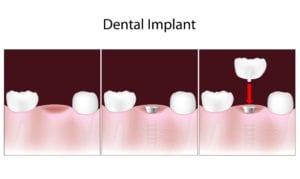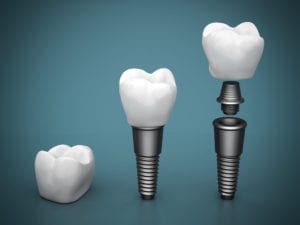
After losing a few teeth, you may not feel as confident flashing your smile. But you’ve heard that dentures are sticky and uncomfortable, and you worry about replacement teeth falling out in the middle of a conversation or while you’re asleep.
So how can you restore your smile without the hassle?
Advancements in dental care now allow patients to permanently replace teeth that will not only be sturdy inside your mouth, but also keep your current bones from deteriorating and improve overall oral health. These procedures are called “dental implants,” and there are many different options available to you!
What Are Dental Implants?

Dental implants are fake teeth that are designed to resemble your natural tooth (or teeth!). But unlike dentures, they don’t just sit on top of your gums – dental implants are actually anchored into your jaw.
They are made up of three parts: the implant, the abutment, and the restoration.
Implants are essentially screws that anchor into your jawbone. The abutment is a cylinder made out of porcelain, gold, or titanium that connects to the implant. And finally, the restoration – the actual replacement tooth – connects to the abutment. Restorations are made out of porcelain but pass easily as bone.
Dental implants are a newer development in the world of dental care, and they come with a number of benefits, such as eliminating the discomfort and hassle of dentures and other forms of teeth replacement. Rather than simply covering up discolored or weakened teeth, or temporarily replacing a row of teeth, dental implants allow a permanent replacement, making your mouth feel like it did when you were younger.
The goals of dental implants are to maintain the appearance of your former smile, while preserving oral hygiene, convenience, and overall dental health. With the tooth secured into your jaw, you won’t even remember that you lost it in the first place!
Types of Dental Implants

The ease and security of dental implants makes the procedure a great option for all kinds of smiles. Depending on your oral needs, you can choose from any of the following options:
Single Tooth Replacement
It may not necessary to replace a whole row of teeth with dentures – just one or two will do the trick. A single anterior or posterior tooth replacement is not your silver filling of the past. It will look and feel like a natural tooth, and does not require any additional or different hygienic care. These replacement teeth will blend in perfectly with your other teeth.
Single replacements can be done for anterior (incisors/canines) or posterior (morals) teeth. Single tooth replacements begin by replacing the tooth root to preserve the surrounding bone.
When dentists replace a tooth root with a titanium post, the post will bond with the original tooth bone, helping to cease the bone’s deterioration. This allows the tooth replacement to have the same foundation as the tooth it replaced.
Substitute tooth roots and tooth replacements are the cornerstone of dental implant procedures. They will improve your ability to bite, chew, and digest food more than the typical dentures or partials that have been the standard for dental care in the past.
Implants to Support Bridges
Start fresh with a whole new row of teeth. Implants are available to secure and support bridges (a whole row of restored crowns) to either the top row or the bottom row of your teeth. The bridges will be molded and customized for your health and cosmetic needs.
If you want a simplified version of the dental implant procedure, consider the ITI implant. It will save you a lot of time and hassle because the procedure only takes one surgery rather than the typical two, to place the implants in your jaw.
The recovery from the surgery takes about four months as the bone and implants form their biological bond. Once the four months have passed by, dental restorations can be attached to your recovered foundation (jawbone/implant) through a connector.
Are Dental Implants Right for You?
Dental implants can help to restore your smile without many of the hassles associated with other types of tooth replacement, but the above procedures are just some of the many services we can use to improve your oral health.
If you are interested in learning more about implants, a dental care professional must evaluate your mouth’s current dimensions and hygienic state to determine whether or not you qualify for this procedure. Contact us today for a free consultation on whether dental implants are the right course of action for you.






